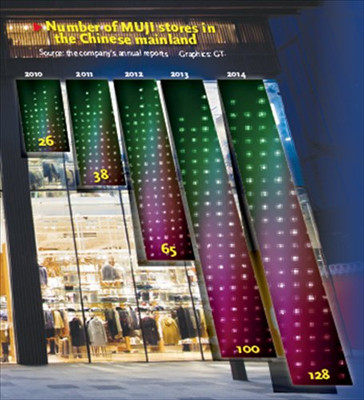
Move seen as response to customer concerns, especially in smaller cities
Japan-based retailer Ryohin Keikaku Co, operator of chain store MUJI, is slashing prices by about 20 percent on more than 200 items in its stores in the Chinese mainland starting Friday, a PR representative of MUJI (Shanghai) Co told the Global Times on Tuesday.
Actually, MUJI has been cutting the prices of some products in the mainland since 2014, said the PR representative who declined to be named. "It will be the third time for the company to implement the price-cutting theme in some of its stores nationwide. The lower prices are being specially featured from Friday until September 17," she said, but the reduced prices will be maintained permanently.
In a MUJI store in China Central Place, a shopping mall in Beijing's Chaoyang district, employees have already finished marking down prices, a staff member surnamed Zhou, who has been working at the store for more than a year, told the Global Times on Tuesday. "Although customer loyalty has consistently improved, I think some of our products are overpriced," he said.
MUJI operates 128 stores in the Chinese mainland, and these outlets are seen as a driver of earnings in the overall overseas business, Masaaki Kanai, president of the Ryohin Keikaku Co, said in the company's fiscal 2014 statements. The fiscal year ends in February.
The company recorded 77.1 billion yen ($617 million) in net sales overseas, up 65 percent on a year-on-year basis, according to the company's 2014 results, which were published in April.
Customers who frequent MUJI said although they are attached to its designs and quality, the prices are a bit high.
Wang Pan, a 28-year-old resident of Wuhan, Central China's Hubei Province, said she makes three trips each year to Japan, where MUJI's prices are much lower than in China.
"For example, an item for daily use that usually costs 550 yen ($4.4) in a MUJI Japanese store would be sold at 55 yuan ($8.6) here," she said.
But not all customers are put off by the prices. "MUJI has already built its reputation in high-quality goods, which will not affect my preference despite the higher pricing" said Yuan Tengzi, a 29-year-old regular buyer who also lives in Wuhan.
In MUJI's store in China Central Place, some items still have their original price tags that show both prices in Japan and in China. For example, a certain kitchen utensil that costs 1,200 yen is sold at 130 yuan in Beijing. "Honestly speaking, some items cost too much here. I would not spend 50 yuan on a small white bowl," Zhou said.
Zhou noted that the major customer group is composed of white-collar workers in the neighborhood who often spend 30 minutes browsing in the store during lunchtime.
Cutting prices shows that MUJI is reconsidering its brand positioning in China, Tu Xinquan, a professor of international trade at Beijing-based University of International Business and Economics, told the Global Times on Tuesday.
"Just as the American coffee company Starbucks is often criticized for its higher prices in China compared with the US, some low-priced foreign branded products are becoming expensive in China due to different marketing strategies," Tu noted.
However, as some companies are expanding in China at a fast pace while also seeking to maintain sustainable revenue growth, they will lower their prices to attract more customers, Tu noted. "MUJI has been seeing steady reductions in its costs, especially as [original equipment manufacturer] costs in China have fallen in recent years," he said.
Plus, MUJI's steady growth in the Chinese mainland has created the possibility for the company to lower the prices, especially after some homegrown imitators started importing items from Japan and selling them at a cheaper prices compared to those at MUJI, Cui Hongbo, analyst at Shanghai-based management consulting firm Zhengjian, told the Global Times on Tuesday.
"Lowering the prices could be seen as a positive step to remain competitive in China," Cui said.
MUJI may also be cutting prices to make its prices more attractive in second- and third-tier cities, where it is expanding, Tu noted.


















































